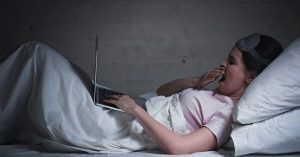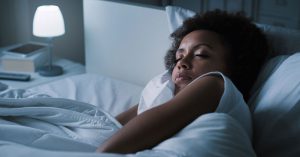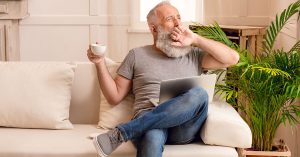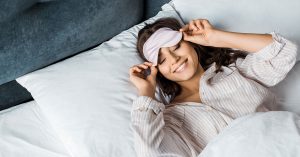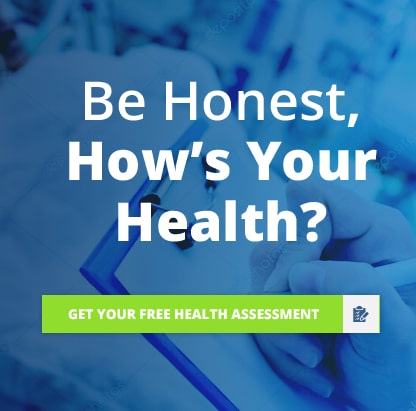Over the past two decades, blue-light-emitting electronic devices have become an extension of our bodies. We carry them with us everywhere during the day – and when it’s time to wind down and go to sleep, we bring them to bed with us.
In fact, according to a study from the National Sleep Foundation, 90% of respondents reported using at least one device within one hour of going to bed at least one day per week.
Many studies have been done on the effect of blue lights and sleep, but does blue light actually affect sleep?
What is Blue Light?
Not all light is created equal. In the light spectrum, blue light is the one with the highest energy. During the day, this is very beneficial: according to Harvard Health Publishing, it can “boost attention, reaction times, and mood.”
But that is not so helpful when we need to fall asleep at night.
According to this study in the Journal of Biophotonics, blue light “sets the human rhythm.” It stimulates cells in the retina that connect to the hypothalamus. This part of the brain controls circadian rhythms and metabolic processes.
As we are constantly surrounded by blue light, this could spell bad news for our sleep quality. From the white lights in our homes, which emit blue light, to our televisions, cell phones, tablets, and many other devices, the hormones that help us sleep are under constant attack.
What Effect Does Blue Light Have on Sleep?
Darkness is essential for sleep, and our body’s instinct is to want to fall asleep as it gets dark. To do that, it releases hormones based on the surrounding light levels. The lack of light in the evening naturally signals our body to release melatonin, a hormone that helps us sleep.
“Melatonin, a hormone produced in the brain’s pineal gland, is often known as the “sleep hormone” or the “darkness hormone.” Melatonin influences sleep by sending a signal to the brain that it is time for rest. This signal helps initiate the body’s physiological preparations for sleep—muscles begin to relax, feelings of drowsiness increase, body temperature drops.”
(ResMed)
Back in the day, melatonin would naturally help us fall asleep shortly after sunset. But now, nighttime has been replaced by bright white lights inside our homes and brighter blue lights from computers, phones, and TVs. Our bodies no longer know when to release melatonin.
READ: What Makes You Sleep?
How to Reduce Blue Light?
We are surrounded by blue light each day, both indoors and outdoors. During the day, the sun is our main source of both white and blue light – as it should be! But that doesn’t mean we can’t reduce our exposure to blue lights after sunset.
Here are a few ways you can reduce exposure to blue light at night:
- In your home, LED and fluorescent bulbs help keep your light bright, but these lights emit blue light. Reduce blue light by dimming lights or switching to lamps with blue-light-blocking light bulbs.
- Inside your bedroom, you should also opt for lightbulbs labeled “warm white” or “yellow-white” rather than “daylight” or “cool white”.
- Nearly all electronic devices emit blue lights. However, most devices now offer “dark modes” or “night settings” that reduce blue light emissions. You can set this to activate automatically at a certain time of the day.
- If your smartphone doesn’t include this feature, you can install an app to replicate it.
- Even better: avoid using smartphones and tablets at least one hour before bed.
- Additionally, consider looking at blue-light-blocking glasses. Start wearing them around sunset so that the blue lights that are present are partially blocked. This will allow your body to trigger the proper hormones to prepare you for sleep that evening.
Final Thoughts on Blue Light and Sleep
Just like computers and the internet, blue lights are a part of daily life. Unfortunately, this means that sleep disorders, stress, and even metabolism problems are now also on the rise. As public awareness on the effects of blue light emerges, so do solutions – from special light bulbs to nighttime apps. Be aware of blug light and take advantage of these solutions to avoid affecting your sleep.

